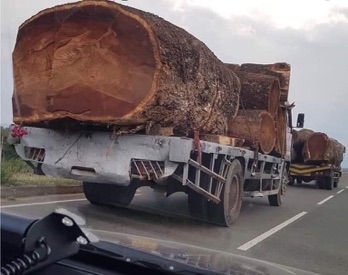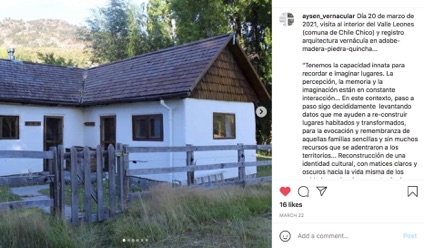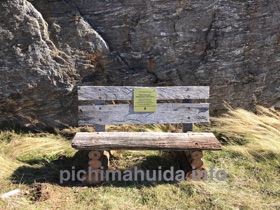
Operational
Access to the Project:
In 2006, the track was in poor state, with many small river crossings, water logged sections, and exposed rocks. There was no vehicle access beyond 6.5 kms (about 16.5 kms from the main road). In 2006 and 2007 it was necessary to improve access to the property. A road was constructed to the site of the headquarters and culverts were installed at small river crossings and problematic wet areas. All this work is been removed now, due to tourism invasion.
The sequence of actions for an ecological restoration project set in a remote area where nature was severely damaged and which is still used for cattle raising:
-
1. The very first action : remove cattle and ensure efficient protection of the area from cattle, in particular
sensitive and eroded areas. 2 cows can be as damaging as 2000 cows.
-
2. Set minimal operational support, such as housing, energy supply. Do not count on using local material
at the start.
-
3. Ensure that you have all necessary minimum equipment at hand, shops are inaccessible.
-
4. Assess the need of building access, in particular the consequences of opening access to the area and bringing
elements which may be potentially damaging for Nature regeneration and protection.
Out-posted headquarters:
➢ Round shaped, without separations inside and with large windows. This shape, with windows all over the curved wall, allows life in constant contact with the surrounding Nature.
➢ The headquarters house may be heated by one round rotating fireplace. The wood fire was chosen as the main
heating method as there is a lot of dead wood on the property left by the degradation of the ecosystem of the valley.
➢ The floor is made of terracotta, it accumulates the sun heat during the day and releases it at night.
Pipes from the stove passing under the terracotta heat the floor and the heaters.
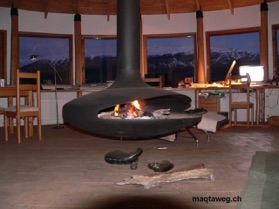

➢ The house is insulated with straw bales and white plastered. The outside is made of local wood.
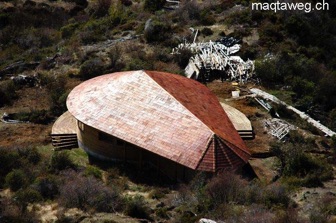

➢ Main legal issue:
The Constitution protects private ownership of water, making it an economic good. The 1981 Water Code also enables the government to grant permanent and transferable water rights to private owners free of charge.
Solution:
- Registered water rights in DGA, use must be reported regularly;
- Use of rainwater for all basic needs.
➢ The roof is covered with tiles of self-dead alerce hardwood.
Use of horse power to move trees for reforestation.
Minimalist lifestyle leads to minimal impact on Nature.
Excluding to the maximum use of newly cut wood or
new books so that the trees are not farmed and killed on our name.
“Green” or not, it is still the transformation of living things into
inert matter which will never be brought back to life.
Self-dead old wood is used for construction:
➢ The house is bioclimatic but not entirely build from old or self-dead material.
➢ Windows are washed to the minimum, clean windows are real dangers for birds.
Wastes:
The Project’s headquarters have 2 small houses and 3 refuges.
The waste management of these is subject to the general policy of waste management of farm houses of the region, that is to say - almost none. There are no tourist activities, so there are no wastes from the tourism industry.
Paper and cardboard - burned in the heating;
Glass - was recycled in Coyhaique until the recycling closed, now saved for a future organic house;
Organic waste - compost;
Electrical and electronic devices - garbage;
Large waste, such as furniture, other household waste - garbage;
Aluminium and jars - garbage;
Coffee capsules - are stored waiting to find a metal recycler in Coyhaique;
PET - garbage;
Clothing, textiles - charity association in Coyhaique.
Special waste:
Batteries (AA and AAA) - stored, waiting for the identification of the correct elimination in Coyhaique;
Paint, pesticides and others - very small amounts, garbage;
Medicines and thermometers with mercury - recovery in pharmacies;
Electric light bulbs - stored awaiting identification of proper disposal;
Vehicle battery: taken to Coyhaique to return to the battery supplier for disposal;
3 septic tanks - final water filters in the soil.
The staff of the project is strongly advised to abstain from participating in
and thus supporting local nature-degrading activities, such as: recreational
nature tourism, harassment of wildlife by participation in photo contests,
wearing new gold (polluting gold mines in the region), consuming local beef,
or salmon, not mentioning using not self-dead wood for heating.
It is advised to verify the source of timber used for construction - lots of illegal
logging, including of protected tree species (cypress), in the region.
Is requested to abstain to consume chocolate as it contributes to deforestation.
Not going to look at the remains of ice at the end of the valley.
2023: The new EU regulation require companies importing products made
from wood, cattle, cocoa, coffee, palm oil and soy to obtain a “due diligence”
statement that confirms the goods were not derived from deforested lands
or linked to forest degradation. It includes timber products, coffee, beef, chocolate, etc.
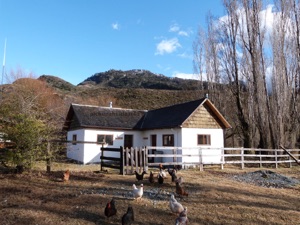
An old destroyed house in adobe was renovated according to original techniques of adobe-making and made liveable.
